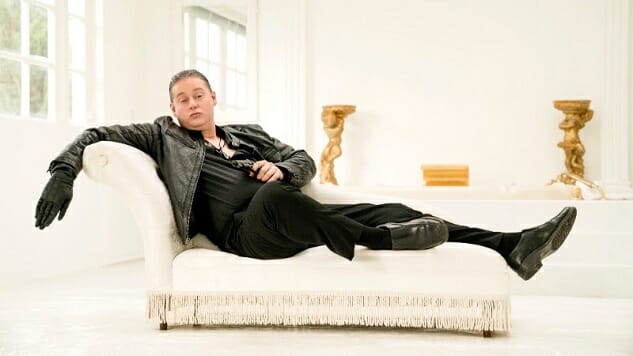Tim Heidecker Turns Political With Decker: Unsealed
Photo courtesy of Adult Swim
Tim Heidecker practically invented an entire genre of comedy. His cult-favorite Adult Swim show Tim and Eric Awesome Show, Great Job! pioneered a surreal style of absurdist humor that spawned countless imitators and paved the way for comedians like Eric Andre, Nathan Fielder and Reggie Watts. Heidecker and partner Eric Wareheim’s comedy is not for everyone, and Heidecker even admits that “the majority of people don’t care for our work.” His comedic style challenges viewers with its bizarre sensibilities and inside jokes. But for those who are in on the joke, Heidecker’s work is some of the most rewarding and hilarious comedy on TV.
Tim and Eric’s comedy was never political. Their TV shows and movies existed in a Tim and Eric-style alternate universe that felt detached from the real world. There was nothing topical in Awesome Show, and Heidecker says, “(his) philosophy with Eric Wareheim was to not be political or current events-based at all.” But as Heidecker has branched out from his partnership with Wareheim in recent years, his work has undergone a political awakening. He’s released music that criticizes Donald Trump and the alt-right, he made videos for Super Deluxe at the Republican and Democratic National Conventions, and he created Decker: Unsealed, which stars himself and comedian Gregg Turkington. Decker, which started as a web series before graduating to Adult Swim’s TV schedule, and which begins its second season on TV on June 4, is centered around Heidecker’s Decker character, a conservative CIA agent who “defends the Constitution” and “protects America from its enemies.”
To viewers who aren’t familiar with Heidecker’s work Decker: Unsealed might seem like a disaster, like a high school student’s unwatchable film project about a “badass” renegade CIA agent who fights back against his “liberal pussy” president. But to Heidecker’s fans, Decker is a hilarious, chaotic and expertly crafted trainwreck that showcases the brilliance of Heidecker’s singular comedic style. Heidecker doesn’t fully memorize his lines for Decker scenes. “There’s no need to prep,” Heidecker tells Paste. “I don’t bother memorizing the lines. It helps to create that feeling of watching somebody struggling to recall stuff. We’ll also go off-script and rant a bit to get everyone confused.” Decker feels as though it could fall apart at any second, which is, of course, by design. “Luckily, we have our director who will tell us if something is just unusable. You don’t want it to be such a disaster that you don’t know what the hell is going on.”
With Decker, Heidecker touches on politics and current events in a way that he deliberately avoided with Awesome Show. “It is certainly influenced by the times we live in. A lot of the political stuff we do with Decker just came up organically,” Heidecker says. “It came about when my character on my online show On Cinema had all these right-wing ideas. That character said he was making his own show called Decker, and that pushed us towards actually making that show for real. It happened naturally. I’m not going to let some rules or perceptions of what I should be doing influence what I actually do.”
Heidecker commonly plays self-titled characters in his work. One version of “Tim Heidecker” is his stand-up persona, a cringe-worthy sendup of hack comics who deliberately bombs every time he performs. In 2011, “Tim Heidecker” the stand-up comedian persona endorsed Donald Trump for president long before Trump announced his candidacy. Before Trump won any primary states in 2016, there was virtually no one who thought he had a shot at winning even the Republican primary. Although his endorsement was a joke, Heidecker was one of the only people on earth who floated the idea of a Trump presidency before 2015. Flint, Michigan-born filmmaker Michael Moore was one of the very few people who made the bold prediction early on that Trump would have a legitimate chance at taking the White House. Like Moore, Heidecker, who grew up in Allentown, PA, was from a region of the country that Trump surprisingly won in the 2016 election. Did Heidecker’s roots key him into something that many people missed about Donald Trump’s potential when he made his prescient, if joking, endorsement of Trump years before Trump even ran? “Perhaps,” Heidecker says. “I recall that growing up, my grandfather didn’t have many books, but the couple of books he did have were Lee Iacocca’s book and Donald Trump’s Art of the Deal. These guys were considered the authorities on business. These were serious men. I had a sense that Trump had been around for a long time, and that he was a stupid person’s idea of what a smart, successful rich person should be. I don’t agree with it, but I can certainly identify with the kind of guy who admires a person like Trump and who sees him as a standard for success.”
Heidecker’s work with Awesome Show partner Eric Wareheim was decidedly apolitical, but Tim Heidecker is not an apolitical person. Since the start of the 2016 presidential election, Heidecker has been an outspoken critic of Donald Trump. He makes “coded, satirical” political statements with Decker, he releases his version of protest songs, and he tweets his political opinions for his half a million followers. With this outspokenness, Heidecker has incurred the wrath of Trump-world. Much of Heidecker’s work is created for the internet, like On Cinema and his work with Jash on YouTube, so he is an easy target for online antagonizers, which are abundant among Trump supporters. Heidecker endures a constant bombardment of “coordinated” online attacks.
-

-

-

-

-

-

-

-

-

-

-

-

-

-

-

-

-

-

-

-

-

-

-

-

-

-

-

-

-

-

-

-

-

-

-

-

-

-

-

-








































